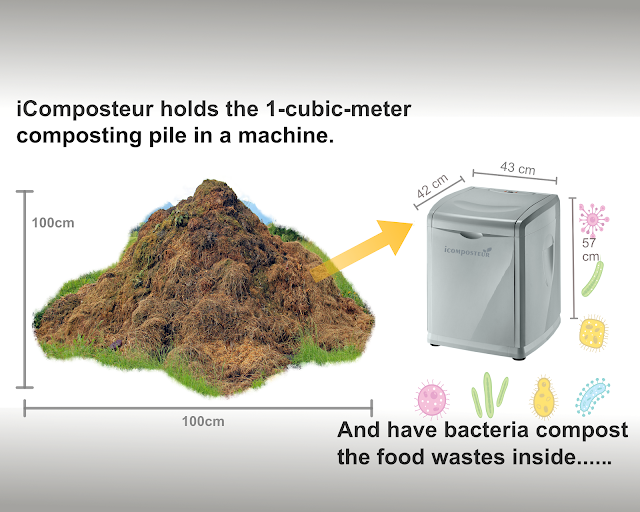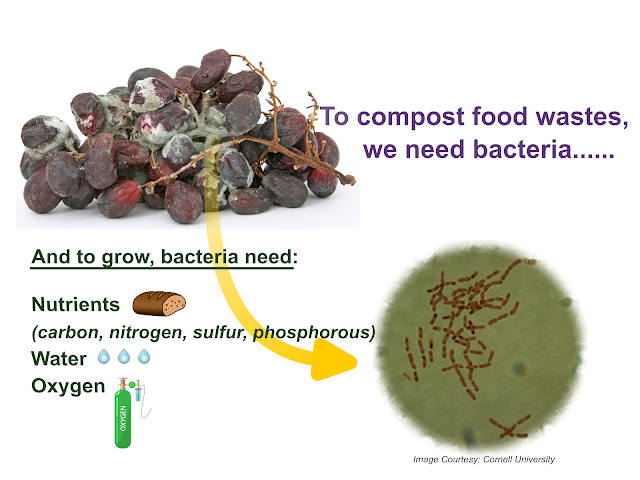OK, iComposteur has its downside. It’s big, heavy(14kg) and emits occasionally gas which smells like vinegar so I recommend you to set it close to the window or on a balcony under a shade to protect it from direct sunlight and rain. But iComposteur does compost for you.
iComposteur holds the classic 1-cubic-meter composting pile in the 42cm*43cm*57cm machine. By auto-heating, it keeps the temperature constantly at 40~60℃ , which is the best range for bacteria activities. It gives oxygen to the bacteria few times a day by letting in fresh air and turning the pile. So iComposteur is running the natural cycle, making real compost for you.
However, the counter-top composter is not composting. They just dry and grind the food wastes.
 |
| Inside iComposteur, there is a composting pile run by billions of bacteria |
iComposteur VS Counter-top composter
| iComposteur | Tero | |
|---|---|---|
| Price | €599 | 595 USD |
| Produce Real Compost? | Yes | No |
| Required accessories? | No | Replacement Filter costs USD 75/year |
| Capacity | 20L | 4L |
| Bacteria Activity? | Yes | No |
| Connect to App? | No | Yes |
| Can You Use Daily? | Yes | Yes |
| Manufacturer | Made in Taiwan | Made in Canada |
Counter-top Composters Do Not Compost
The counter-top composter, (ex. Tero, FoodCycler...). They only do two jobs: They dry and grind your food wastes. Obviously, the drying process kills bacteria because bacteria are living cells, they need water to reproduce and grow so that they can decompose the food wastes.
Bacteria Need Water, Air and Heat for Composting
Bacteria will reduce naturally the volume of food wastes because they eat the carbon and mineralize the nitrogen in the food wastes in 2-3weeks if you give them air and some heat. This is decomposition. The best temperature for bacteria to work is 40~60℃ where they decompose most effectively. When bacteria decompose the food, they naturally give out the heat. So that's why an outdoor classic composting pile has to be 1-cubic-meter big to retain the heat. Even in winter, a composting pile can have constantly 60℃ inside and keep cooking.
After the works done by bacteria, the remaining long-chain carbon can’t be broken anymore is the "humus". Humus hold water, create more space in the soil to store air. Its surface is also negatively charged so it holds positive charged ions in the soil, for example, positive ions. Many positive ions in the soil are macro-nutrients that plants need, such as calcium(Ca2+), magnesium (Mg2+), sodium (Na+) and potassium (K+) and nitrogen in ammonium form (NH4+) etc. Humus also attracts earthworms, bacteria and fungi in the soil because it still has some nutrients. So the counter-top composter say that you can get "compost" from drying and grinding processes, it is nothing but marketing.
Counter-top Composters is Another "Food Blender" in the Kitchen
Do you think drying and grinding the food waste really helps ? Only turning and moisturizing the food waste can help bacteria reproduce more and decompose food wastes faster! Dryness kills all bacteria. Grinding the food waste is useless and it wastes energy.
Depends on how you dispose food wastes, some communities collect food wastes and compost them altogether. Of course, collecting and transporting the food wastes costs energy for truck. But the real benefit of compost for improving the soil and reducing the use of synthesized fertilizer is huge!
With a counter-top composter, you are taking extra energy for drying and grinding the food wastes just to make your kitchen look neat and feel good. Counter-top composters do not compost. The end products-dried powders of food wastes is not humus, it can’t hold any water, air and ions for soil. It just fools people to believe that they are more green by buying another “Food Blender” for the kitchen.
Image Courtesy: Bacteria icon vector created by macrovector_official - www.freepik.com






0 Comments